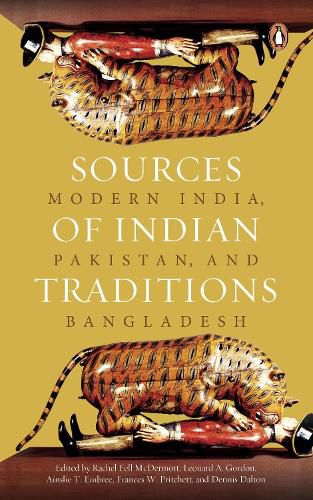Readings Newsletter
Become a Readings Member to make your shopping experience even easier.
Sign in or sign up for free!
You’re not far away from qualifying for FREE standard shipping within Australia
You’ve qualified for FREE standard shipping within Australia
The cart is loading…






Sources of Indian Traditions is an indispensable and essential selection of primary readings on the social, intellectual and religious history of India from the decline of Mughal rule in the eighteenth century to today. It details the advent of the East India Company, British colonization, the struggle for liberation, the partition of 1947 and the creation of Pakistan, Bangladesh, and contemporary India. Divided thematically, it begins with a chapter on eighteenth-century intellectual and religious trends that set the stage for India's modern development. Nineteenth-century debates over social reform, featuring the leaders of reform and revival movements, follow. Chapters on Gandhi and his reception both nationally and abroad and different perspectives on and approaches to partition, precede a section devoted to the drafting of the Indian constitution, the rise of nationalism, the influence of Western thought, the conflict in Kashmir, nuclear proliferation, minority religions, secularism and the role of the Indian political left. The last two sections portray Pakistan and its struggle for national identity and Bangladesh and the controversies over the fruits of freedom.
$9.00 standard shipping within Australia
FREE standard shipping within Australia for orders over $100.00
Express & International shipping calculated at checkout
Sources of Indian Traditions is an indispensable and essential selection of primary readings on the social, intellectual and religious history of India from the decline of Mughal rule in the eighteenth century to today. It details the advent of the East India Company, British colonization, the struggle for liberation, the partition of 1947 and the creation of Pakistan, Bangladesh, and contemporary India. Divided thematically, it begins with a chapter on eighteenth-century intellectual and religious trends that set the stage for India's modern development. Nineteenth-century debates over social reform, featuring the leaders of reform and revival movements, follow. Chapters on Gandhi and his reception both nationally and abroad and different perspectives on and approaches to partition, precede a section devoted to the drafting of the Indian constitution, the rise of nationalism, the influence of Western thought, the conflict in Kashmir, nuclear proliferation, minority religions, secularism and the role of the Indian political left. The last two sections portray Pakistan and its struggle for national identity and Bangladesh and the controversies over the fruits of freedom.